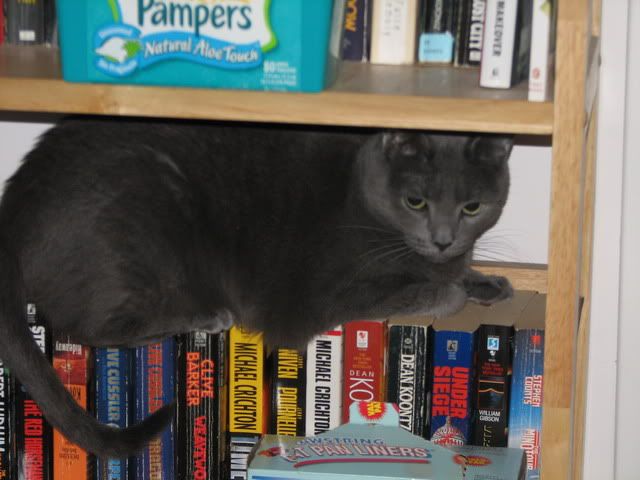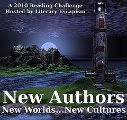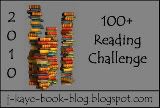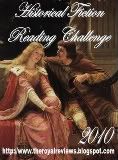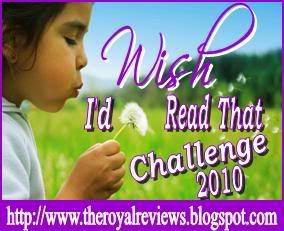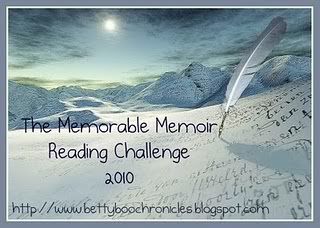I enjoyed the first part of this book very much. From the title, I assumed the main character would be Spring Moon and that the story would be told from her point of view. I read somewhere that it's been compared to Gone With The Wind but I have to disagree--except to say that it concerns a family torn apart by civil war. Other characters were introduced into the story and subsequent chapters would go between Spring Moon's point of view and some of the others. I found it distracting, particularly after Spring Moon returned home after the death of her husband. The illicit romance between Spring Moon and her uncle didn't really ring true to me and I thought it detracted from the story. Otherwise, I enjoy historical fiction and particularly learning about events in history occuring in other countries--in this case, China.
Wednesday, August 29, 2007
Thursday, August 23, 2007
What Kind of Book Crosser Are You?
| What kind of bookcrosser are you Your Result: ring in bundles They come and come. Ringbooks come in herds, that's what you say! You made a basket on your mail box, otherwise the frontdoor woldn't open when you return from work. You know your postman by christian name. | |
| Playfull RBACKer | |
| Obsessive releaser | |
| Thematic dropper | |
| Talk of the toy | |
| Love to meet | |
| lucky lurker | |
| strange looking bystander | |
| What kind of bookcrosser are you Quiz Created on GoToQuiz | |
Posted by
Irishcoda
at
7:54 PM
0
comments
![]()
Labels: Fun
Indocrination
Booking Through Thursday
When growing up did your family share your love of books? If so, did one person get you into reading? And, do you have any family-oriented memories with books and reading? (Family trips to bookstore, reading the same book as a sibling or parent, etc.)
The one family member who really got me into reading was my mom. I remember going to the library with her when I was about five and being totally awed that I could bring books home with me. also, when my grandmother would take me grocery shopping, she would let me choose a Little Golden Book to keep at her house. I loved to look at the pictures at first and then when I learned to read, I'd read them to my younger cousins and brother.
My mother loved to read and had a bookcase full of what would be called classics now. When I was 10 or 12, I began wanting to read those books. She made several recommendations to me: Gone With the Wind, Imperial Woman, Love Is Eternal, The Brothers Karamazov, Crime and Punishment, and many others. She'd warn me that some of the books would be difficult to understand and that I should look in a dictionary to understand more of the words.
About a year later, I began begging to go to the library and she'd take me 2-3 times a week before finally complaining it was too much. She told me to check out the max allowed on my card so that she could make fewer trips. I was delighted. I was checking out about 15 books at a time. She was always checking out books too.
Once I became an adult, we'd pass books back and forth on occasion but then our tastes began to diverge. That was okay. We could still spend an afternoon together just reading contentedly. My father and brother are not readers and they were not into that. In fact, my dad was sometimes jealous of my mother's love for reading and he'd find reasons to interrupt her.
Lucky me, my husband is a reader too!
I really appreciate this question today. I have many unhappy memories of my mother and it is really nice to remember this and be filled with a warm glow.
Posted by
Irishcoda
at
1:39 PM
2
comments
![]()
Labels: Booking Through Thursday
Wednesday, August 22, 2007
This Really Is Sad!
I saw a post on the forums at Book Crossing called "This is so sad" and went to read the full article. One in 4 Americans didn't read any books at all last year, is that possible? To me, it's mind-boggling, totally unfathomable! Yet here is the article:
The New York Times
August 21, 2007
One in Four Read No Books Last Year
By THE ASSOCIATED PRESS
Filed at 11:12 p.m. ET
WASHINGTON (AP) -- There it sits on your night stand, that book you've meant to read for who knows how long but haven't yet cracked open. Tonight, as you feel its stare from beneath that teetering pile of magazines, know one thing -- you are not alone.
One in four adults read no books at all in the past year, according to an Associated Press-Ipsos poll released Tuesday. Of those who did read, women and older people were most avid, and religious works and popular fiction were the top choices.
The survey reveals a nation whose book readers, on the whole, can hardly be called ravenous. The typical person claimed to have read four books in the last year -- half read more and half read fewer. Excluding those who hadn't read any, the usual number read was seven.
''I just get sleepy when I read,'' said Richard Bustos of Dallas, a habit with which millions of Americans can doubtless identify. Bustos, a 34-year-old project manager for a telecommunications company, said he had not read any books in the last year and would rather spend time in his backyard pool.
That choice by Bustos and others is reflected in book sales, which have been flat in recent years and are expected to stay that way indefinitely. Analysts attribute the listlessness to competition from the Internet and other media, the unsteady economy and a well-established industry with limited opportunities for expansion.
When the Gallup Poll asked in 2005 how many books people had at least started -- a similar but not directly comparable question -- the typical answer was five. That was down from 10 in 1999, but close to the 1990 response of six.
In 2004, a National Endowment for the Arts report titled ''Reading at Risk'' found only 57 percent of American adults had read a book in 2002, a four percentage point drop in a decade. The study faulted television, movies and the Internet.
Who are the 27 percent of people the AP-Ipsos poll found hadn't read a single book this year? Nearly a third of men and a quarter of women fit that category. They tend to be older, less educated, lower income, minorities, from rural areas and less religious.
At the same time, book enthusiasts abound. Many in the survey reported reading dozens of books and said they couldn't do without them.
''I go into another world when I read,'' said Charlotte Fuller, 64, a retired nurse from Seminole, Fla., who said she read 70 books in the last year. ''I read so many sometimes I get the stories mixed up.''
Among those who said they had read books, the median figure -- with half reading more, half fewer -- was nine books for women and five for men. The figures also indicated that those with college degrees read the most, and people aged 50 and up read more than those who are younger.
Pollyann Baird, 84, a retired school librarian in Loveland, Colo., says J.K. Rowling's Harry Potter fantasy series is her favorite. But she has forced herself to not read the latest and final installment, ''Harry Potter and the Deathly Hallows,'' because she has yet to file her income taxes this year due to an illness and worries that once she started the book, ''I know I'd have to finish it.''
People from the West and Midwest are more likely to have read at least one book in the past year. Southerners who do read, however, tend to read more books, mostly religious books and romance novels, than people from other regions. Whites read more than blacks and Hispanics, and those who said they never attend religious services read nearly twice as many as those who attend frequently.
There was even some political variety evident, with Democrats and liberals typically reading slightly more books than Republicans and conservatives.
The Bible and religious works were read by two-thirds in the survey, more than all other categories. Popular fiction, histories, biographies and mysteries were all cited by about half, while one in five read romance novels. Every other genre -- including politics, poetry and classical literature -- were named by fewer than five percent of readers.
More women than men read every major category of books except for history and biography. Industry experts said that confirms their observation that men tend to prefer nonfiction.
''Fiction just doesn't interest me,'' said Bob Ryan, 41, who works for a construction company in Guntersville, Ala. ''If I'm going to get a story, I'll get a movie.''
Those likeliest to read religious books included older and married women, lower earners, minorities, lesser educated people, Southerners, rural residents, Republicans and conservatives.
The publishing business totaled $35.7 billion in global sales last year, 3 percent more than the previous year, according to the Book Industry Study Group, a trade association. About 3.1 billion books were sold, an increase of less than 1 percent.
The AP-Ipsos poll was conducted from August 6 to 8 and involved telephone interviews with 1,003 adults. It had a margin of sampling error of plus or minus 3 percentage points.
------
AP Manager of News Surveys Trevor Tompson and AP News Survey Specialist Dennis Junius contributed to this report.
(This version CLARIFIES that people in the West and Midwest are more likely to read at least one book a year, but that Southerners who do read tend to read more books.)
Posted by
Irishcoda
at
4:10 PM
1 comments
![]()
Labels: About reading
Reliquary by Lincoln Child & Douglas Preston
A year ago, I read the prequel to this book, Relic. I shouldn't have waited so long to read The Reliquary but I could remember enough of the basic facts from the first book so I wasn't lost. To my disappointment, Agent Pendergast wasn't introduced until almost half way through the book. I like the other characters but I didn't think they were strong enough to carry that first half. The "yellow" journalist Bill Smithback was just flat out obnoxious as was most of the upper echelon of the police department. That had a stereotypical or cliche-ish feel to it that I didn't like. You have to suspend belief in reality in several places throughout the book. Sometimes that was annoying; sometimes it was amusing. When I looked back at what I wrote about the first book it seems that I enjoyed it much more than this one. I really like the Pendergast character so I'm looking forward to the next two books--I think he's supposed to be the "star" in those...I hope so!
There is one thing that I appreciated in this book: the authors focused a lot on the issues of the homeless living underground in New York City. Many are veterans of our wars or are mentally ill; I liked the fact that the authors humanized them and brought attention to their needs.
Posted by
Irishcoda
at
4:02 PM
0
comments
![]()
Labels: Books I've Read
The Great Deluge
One of the saddest, stupidest things about being human is the seeming inability to learn from history--collectively, anyway. I mean that we as a group of people can repeat the same stupid mistakes over and over. Isn't the definition of crazy doing the same thing over and over but expecting a different result? Maybe we are collectively crazy.
At any rate, here is one thing I know: we are not prepared for a natural disaster. We are probably equally unprepared for a man-made disaster but I don't want to go there at the moment. If there was a massive storm, a tsunami, the worst type of tornado, an earthquake, a plague -- I think it would take FEMA about as long to get their act together as they did for Katrina. Or ... did racism really play a part? I'd hate to think so but I wondered as I read this book.
Douglas Brinkley is a historian who happened to be living in the area when Hurricane Katrina came to visit and wreak terror and death and destruction on the Gulf States the last week of August 2005. He may not have checked all his facts (that's a criticism I read elsewhere of the book) but I have to say that The Great Deluge seemed pretty spot on from everything I can remember of the horrifying media coverage.
The book begins on Saturday, August 27--before the storm hit. It was pretty apparent from all the reports that this was a significant, dangerous storm and yet Mayor Nagin of New Orleans did not order a mandatory evacuation of the city until it was too late. That was just one in a long series of stupid mistakes made on the part of government officials from the mayor on up to President Bush.
Some points struck me as being particularly horrible:
1. Worst of all, they knew it could happen. By "they" I mean everyone who whined they had no idea the levees in New Orleans could be breached. All along there have been reports that the levees were inadequate and crumbling and needed fixing. The money that could have been spent on repairing or upgrading the levees went to shipping interests--i.e. dredging and other projects to make more profit. There was even a simulation presented at least a year before Katrina. In the hurricane Pam simulation, New Orleans was flooded out -- basically it was the Katrina scenario. Did anyone pay attention? No!
2. Here's one more worst of all: it could happen again! You'd think we'd have learned from this but nooooooo, New Orleans is in the same situation it was in before! Well, duh! And duh! And duh duh duh!
3. There was never a plan to evacuate the poor and the elderly. There was a "looks good" plan on the internet talking about using buses to get the people out but no one ever intended it should happen. Huh??? And even if they had, by the time Nagin called a mandatory evacuation, it was too late to get all those people out of New Orleans--and there were a LOT of elderly, disabled and/or poor people trapped in New Orleans.
4. There was no food or water or medical supplies at the stadium for the people who had to evacuate there. Why? It's explained but not to my satisfaction!
5. Some hospitals were abandoned and left to fend for themselves! The stories of the courageous doctors and nurses and other personnel who tried to care for their sick and dying patients under the worst dire circumstances made me want to cry. I know that recently a doctor was acquitted of mercy-killing a patient...welll, if you read this book you'll agree with me when I say had I been one of those patients I would have been begging the doctors to end it for me then and there.
6. Nagin "fiddled" while New Orleans drowned. The man just seemed to come totally unglued. This isn't pick-on-Nagin day because President Bush and Governor Blanco made some very serious errors but Nagin hid in a high rise hotel, avoided the evacuees because he was afraid of them, took a week long "vacation" to Houston a week after Katrina and otherwise exhibited some pretty strange behavior.
7. Most of the New Orleans police department left their posts and some of them even stole cars! The rest, heroes all, were treated abominably by citizens and officials alike because the bad apples gave them all a bad name
8. I also had no idea about "the big dump" which just turns my stomach. I don't think there's an excuse for this kind of behavior no matter how bad things get. "The big dump" means that vandals and looters took the time to move their bowels on whatever or where ever they pleased--on desks, in deep fry cookers, in freezers, on equipment, clothes, and so on. Basically the message was supposed to be: "Shit on you." They were even dumping in public in the stadium and in the convention center. What ignorance!
In ten years, a different history will be written. That always happens--a new spin is given to a historic event. I'm sure what happened will be "cleaned up" considerably and all the mistakes will be glossed over. Maybe that's why we don't learn from the past. We are doomed to keep going 'round and 'round.
Posted by
Irishcoda
at
2:33 PM
0
comments
![]()
Labels: Books I've Read
Friday, August 10, 2007
Fall Into Reading
It may be a little premature but I've been thinking about which books I'd like to read between September 23 and December 21st. I need to get moving on books I've been hoarding from places like Book Crossing and Paperback Swap so here is my first tentative list (subject to change as we draw closer to the holidays!). In no particular order:
Mother of Pearl by Melinda Haynes
Standing on the Rainbow by Fannie Flagg
Midwives by Chris Bohjalian
Book of Ruth by Jane Hamilton
Picturing the Wreck by Dani Shapiro
Fall On Your Knees by Ann Marie McDonald
The Hundred Secret Senses by Amy Tan
Vanished by Mary McGarry Morris
How Mrs. Claus Saved Christmas by Jeff Guinn
The Purpose Driven Life by Rick Warren
Emotional Intelligence by Daniel Goleman
Train Go Sorry by Leah Hager Cohen
In Cold Blood by Truman Capote
The Jungle by Upton Sinclair
A Christmas Carol by Charles Dickens
Posted by
Irishcoda
at
10:04 PM
1 comments
![]()
Labels: Book Lists
Summer Reading So Far
Of the books I originally picked to read, I've abandoned three--two by Jonathan Kellerman (I decided I wasn't going to read any more Alex Delaware books) and My Life Among the Serial Killers. I just didn't have the stomach for that last one. I read four of the books on my list so far and have four to go. I'm in the middle of one book I substituted and finished another. I used to be able to finish a "big" book in less than a week but that was before I had kids and a busy life. I'm hoping I can finish the four I have left by mid-September, which is when the Fall Reading Challenge begins.
Posted by
Irishcoda
at
9:56 PM
0
comments
![]()
Labels: Reading Progress
Thursday, August 9, 2007
Multiples
Booking Through Thursday
Do you have multiple copies of any of your books? Yes I do :)
If so, why? Absent-mindedness? You love them that much? First Editions for the shelf, but paperbacks to read? Actually ... it's all 3. Most of the duplicates I have are because I want either the hardback or signed copies for my shelf and the paperback to read and pass along. Sometimes I forget I have a book on my TBR already and I pick up a duplicate copy by mistake. That's why I've made a data base. I have over 430 books, still counting! And finally, if I love a book enough to pass it on to someone I'll keep one and buy/trade for another to pass along.
Posted by
Irishcoda
at
5:51 PM
1 comments
![]()
Labels: Booking Through Thursday
Thursday, August 2, 2007
Letters! We Get Letters!
Booking Through Thursday
Have you ever written an author a fan letter? Yes
Did you get an answer? Yes, from one author named Stephen Mark Rainey
Did it spark a conversation? A meeting?
(And, sure, I suppose that e-mails DO count . . . but I’d say no to something like a message board on which the author happens to participate.) Emails for a short period of time
Posted by
Irishcoda
at
7:40 PM
1 comments
![]()
Labels: Booking Through Thursday
Mystic River
I thought this was one of the best mystery thrillers I've ever read! There was no "formula" feel to it--I would say it was more character driven than plot driven. For a year of Saturdays, Sean, Jimmy and Dave are friends. Then one day a car comes down the street. One of the boys gets into the car and is abducted for 4 days. The incident changes all three of them. They grow apart and grow up, their lives taking different directions. They are brought together by a savage and tragic murder. As the pieces began to fit together, I thought about the expression "what goes around comes around". It certainly does! Definitely a great read!
Posted by
Irishcoda
at
7:39 PM
0
comments
![]()
Labels: Books I've Read
